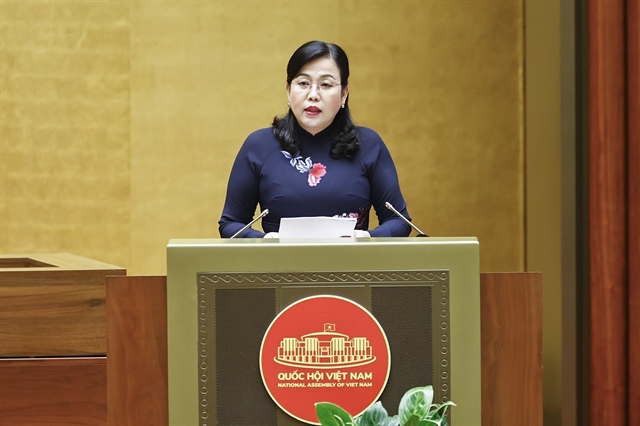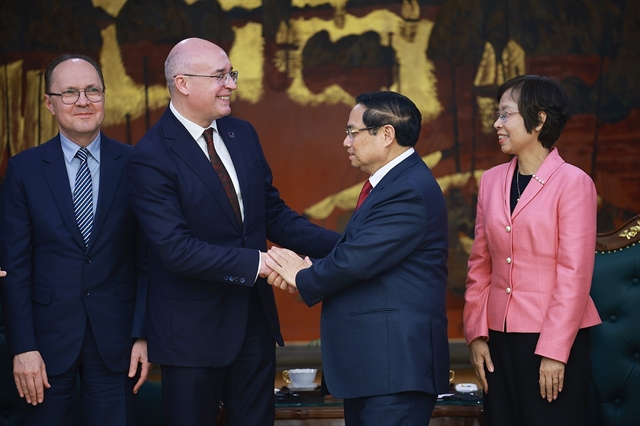 Politics & Law
Politics & Law

 |
| Minister of Agriculture and Environment Trần Đức Thắng presents the Government’s proposal on Tuesday morning.— VNA/VNS Photo Doãn Tấn |
HÀ NỘI — Việt Nam is set to strengthen control over its rare earth resources under a new draft Law on Geology and Minerals, which introduces a separate chapter on the management and exploitation of the strategic national asset.
The proposed amendments include four new articles outlining the State’s general policy on rare earths, the National Strategy on Rare Earths, regulations on mineral reserves and the protection of rare earth deposits, and detailed rules for exploration and exploitation.
The revisions also introduce stricter mechanisms and sanctions for activities related to rare earth minerals, aiming to ensure more efficient and sustainable use.
Minister of Agriculture and Environment Trần Đức Thắng presented the Government’s proposal, authorised by the Prime Minister, on Tuesday morning as the National Assembly continued the agenda of its 10th session.
The changes are designed to address difficulties that have arisen during the implementation of the current law, including obstacles in licensing, exploration, and the use of minerals for national key projects, as well as a lack of clear criteria for identifying areas exempt from mining auctions, according to the minister.
The draft also seeks to formalise decentralisation measures and create a distinct framework for managing rare earths that reflects present-day conditions.
Presenting the assessment report, Nguyễn Thanh Hải, Chairwoman of the National Assembly’s Committee for Science, Technology and Environment, said the committee largely agreed with the addition of a new chapter to strengthen oversight of rare earth activities.
However, the committee suggested that the drafting body consider developing a separate chapter defining principles for the management of strategic minerals in general and rare earths in particular.
It also recommended clarifying the distinctions between rare earths and Group I minerals and proposed that written opinions from the Ministry of National Defence and the Ministry of Public Security be required before exploration or mining licences are issued in areas sensitive to national defence and security.
 |
| Nguyễn Thanh Hải, Chairwoman of the National Assembly’s Committee for Science, Technology and Environment delivers the assessment report on Tuesday morning in Hà Nội.— VNA/VNS Photo Doãn Tấn |
Personal income tax
Also in the morning session, the National Assembly heard the Government’s presentation and the Economic and Financial Committee’s assessment of the draft revised Law on Personal Income Tax.
Minister of Finance Nguyễn Văn Thắng said the draft broadened the scope of taxable income for individual business activities to include income from agency, brokerage and partnership operations with organisations as well as earnings from e-commerce and digital platform-based businesses.
The revisions, he explained, aimed to ensure fairness among taxpayers, enhance transparency and align with international integration requirements.
The draft law sets the annual tax-free revenue threshold at VNĐ200 million (US$7,600), in line with the recently adopted Law on Value Added Tax.
Thắng added that under a resolution approved on October 17, by the National Assembly Standing Committee, the family circumstance-based deduction for personal income tax would rise from VNĐ11 million ($417) to VNĐ15.5 million ($588) per month for taxpayers and from VNĐ4.4 million ($167) to VNĐ6.2 million ($235) per month for each dependent.
The new deductions would apply from January 2026.
The draft would also simplify the progressive tax scale from seven brackets to five, with proposed tax rates of 5 per cent, 15 per cent, 25 per cent, 30 per cent and 35 per cent.
The top rate would apply to monthly taxable income exceeding VNĐ100 million ($3,800).
According to Government estimates, the reform, combined with higher deductions, could reduce State budget revenue by about VNĐ27.4 trillion ($1.04 billion) per year but would ease the tax burden for most taxpayers.
Presenting the committee’s assessment, Phan Văn Mãi, Chair of the NA’s Committee for Economy and Finance, said the proposed VNĐ200 million tax-free threshold was too low compared to current business realities and unfair relative to salaried employees who benefit from higher personal deductions.
The committee suggested recalculating the threshold to ensure greater equity and consistency with the revised deduction levels.
It also proposed synchronising the implementation dates for new tax rules on wages, salaries and business income to make tax settlement procedures more convenient for taxpayers.
Asset, income declarations
In the same session, the National Assembly also heard the Government’s proposal to amend the Law on Anti-Corruption, focusing on updating asset and income declaration requirements.
Inspector General of the Government Inspectorate Đoàn Hồng Phong said the draft law would raise the minimum value of assets subject to declaration from VNĐ50 million ($1,900) to VNĐ150 million ($5,700) and increases the threshold for declaring additional assets or income growth within a year from VNĐ300 million ($11,400) to VNĐ1 billion ($38,000).
The adjustments, he noted, were designed to reflect current economic conditions and rising prices compared with 2018.
The draft also refines anti-corruption prevention policies, clarifies the authority of inspection bodies in investigating corruption-related cases and enhances mechanisms for receiving and handling complaints and denunciations of corruption.
Presenting the committee’s verifying report on the issue, Hoàng Thanh Tùng, Chair of the National Assembly’s Committee on Legal and Judicial Affairs, said the committee agreed with the proposed increases, noting that they would better reflect current income levels and economic realities.
The revisions would help focus oversight on large-value assets while reducing unnecessary administrative procedures for smaller declarations, thereby improving the effectiveness of corruption prevention.
He also said that to ensure legislative stability and compliance with the Law on the Promulgation of Legal Documents, specific monetary thresholds should not be fixed directly in the law.
Instead, the Government should be authorised to define them in sub-law regulations, allowing for flexible adjustments in line with changing socio-economic conditions. — VNS




